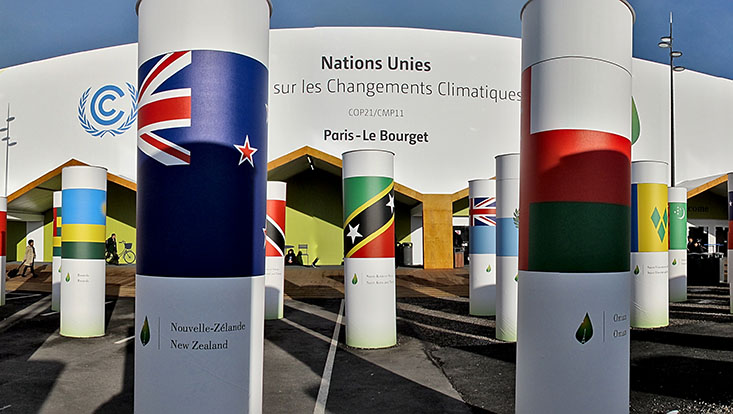Climate science calls for a powerful global research programme
29 November 2018, by Stephanie Janssen

Photo: Wikimedia commons
Six international researchers have now released a strategy paper that is essentially a global wake-up call. In light of the upcoming UN Climate Conference COP24 in Katowice, Poland, they underscore the need for an effective global climate research agenda – like the World Climate Research Programme (WCRP) – so as to achieve significant improvements in regional and local climate forecasts. In this regard, especially climate modeling has to be improved.
“We need to make major advances now,” says Detlef Stammer from Universität Hamburg’s Center for Earth System Research and Sustainability (CEN), “in order to improve the forecasting accuracy for specific regions, which will allow us to provide meaningful climate information for the general public, political decision-makers and industry alike. A society can only decide how to prepare for the future climate if it can draw on a scientifically sound basis.” In the 2015 Paris Agreement, the Intergovernmental Panel on Climate Change stressed very similar priorities.
The respected researchers who co-authored the paper summarize those aspects that matter most: only an effective strategic research agenda can successfully bundle climate research resources from around the globe, and only then can climate research be sufficiently intensified. To make this happen, in the future we will need far more coordination in terms of climate measurements and observations, the development of climate simulations, and the international management and exchange of climate-relevant data – and this level of coordination will in turn require a suitable global infrastructure. In this regard, not only effective scientific leadership, but also the guarantee of long-term financing from all participating nations will be essential components.
“We need to intensify and further advance international climate research, and to particularly focus on extremely high-resolution climate simulations and on correctly interpreting global climate data. To do so, we’ll have to mobilize the best computer resources that we can get our hands on,” says Stammer. “Otherwise, we’re not going to produce the necessary results or achieve critical goals in the foreseeable future.”
Scientific publication:
Science Directions in a Post COP21 World of Transient Climate Change: Enabling Regional to Local Predictions in Support of Reliable Climate Information (2018) - D. Stammer, A. Bracco, P. Braconnot, G. P. Brasseur, S. M. Griffies, E. Hawkins
https://doi.org/10.1029/2018EF000979
Detlef Stammer, Centrum für Erdsystemforschung und Nachhaltigkeit (CEN), Universität Hamburg
Annalisa Bracco, School of Earth and Q4 Atmospheric Sciences, Georgia Institute of Technology, Atlanta, GA, USA
Pascale Braconnot, Laboratoire des Sciences du Climat et de l’Environnement, unité mixte CEA-CNRS-UVSQ, Université Paris Saclay, Gif sur Yvette Cedex, France
Guy P. Brasseur, Max Planck Institute for Meteorology Hamburg, Germany; National Center for Atmospheric Research, Boulder, CO, USA
Stephen M. Griffies, NOAA Geophysical Fluid Dynamics Lab and Princeton University Atmospheric and Oceanic Sciences Program, Princeton, NJ, USA
Ed Hawkins, National Centre for Atmospheric Science, Leeds, UK, Department of Meteorology, University of Reading, Reading, UK
Contact
Prof. Dr. Detlef Stammer
Center of Earth System Research and Sustainability (CEN) – Director
Upcoming Cluster of Excellence Climate, Climatic Change, and Sustainability (CliCCS) – Speaker
Universität Hamburg
Tel.: +49 40 42838-5052
E-Mail: detlef.stammer"AT"uni-hamburg.de


